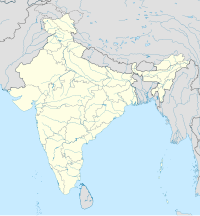Lata (region): Difference between revisions
m →Bibliography: http→https for Google Books and Google News using AWB |
|||
| Line 15: | Line 15: | ||
''Shakti-Sangam-Tantra'', a [[Shaktism|Shakti cult]] text composed before 7th century CE, states that Lata was located to the west of [[Avanti (India)]] and to the north-west of [[Vidarbha]].{{sfn|Sharma|1978|218}} |
''Shakti-Sangam-Tantra'', a [[Shaktism|Shakti cult]] text composed before 7th century CE, states that Lata was located to the west of [[Avanti (India)]] and to the north-west of [[Vidarbha]].{{sfn|Sharma|1978|218}} |
||
According to Tej Ram Sharma, Lata's northern boundary was formed by the [[Mahi River]], or at times, by the [[Narmada River]]. In the south, Lata extended up to the [[Purna River (tributary of Tapti)|Purna River]], and at times, up to [[Daman, Daman and Diu|Daman]]. It included [[Surat]], [[Bharuch]], [[Kheda]] and [[ |
According to Tej Ram Sharma, Lata's northern boundary was formed by the [[Mahi River]], or at times, by the [[Narmada River]]. In the south, Lata extended up to the [[Purna River (tributary of Tapti)|Purna River]], and at times, up to [[Daman, Daman and Diu|Daman]]. It included [[Surat]], [[Bharuch]], [[Kheda]] and [[Vadodara]].{{sfn|Sharma|1978|218}} |
||
According to [[Georg Bühler]], Lata was the area between [[Mahi River]] and [[Kim River]], and its major city was Bharuch.{{sfn|Sharma|1978|218}} |
According to [[Georg Bühler]], Lata was the area between [[Mahi River]] and [[Kim River]], and its major city was Bharuch.{{sfn|Sharma|1978|218}} |
||
Revision as of 07:28, 25 November 2016
Lata (IAST: Lāṭa) was a historical region of India, located in the present-day Gujarat state.
Location and extent
Shakti-Sangam-Tantra, a Shakti cult text composed before 7th century CE, states that Lata was located to the west of Avanti (India) and to the north-west of Vidarbha.[1]
According to Tej Ram Sharma, Lata's northern boundary was formed by the Mahi River, or at times, by the Narmada River. In the south, Lata extended up to the Purna River, and at times, up to Daman. It included Surat, Bharuch, Kheda and Vadodara.[1]
According to Georg Bühler, Lata was the area between Mahi River and Kim River, and its major city was Bharuch.[1]
Historical mentions
The Lata region is not mentioned in the earliest of the Puranas or the Sanskrit epics. The earliest mention of the region probably comes from the writings of the 2nd century Greco-Egyptian writer Ptolemy.[2] The Larike mentioned by him is identified with Lata by multiple scholars including H. D. Sankalia[3] and D. C. Sircar,[4] The Greek name might have derived from Lār-deśa ("Lār country"), the Prakrit form of Lāṭa.[2] Ptolemy mentions that the delta of the river Mophis (identified with Mahi) and Barygaza (Bharuch) were located in Larike.[2]
Dipavamsa and Mahavamsa mention that Prince Vijaya came from the Sinhapura city in the Lala or Lada region. This region is variously identified as Lata in Gujarat or Rarh in Bengal.[5]
In the Gupta-era records, Lata is mentioned as a vishaya (IAST: viṣaya) or district.[5] The Lāṭa-viṣaya was well-known until the 8th century.[2]
The Latesvara country mentioned in some early Gurjara-Pratihara and Rashtrakuta records is probably same as Lata.[6]
The Chalukyas of Lata ruled the region during the 10th and 11th centuries.[7]
References
- ^ a b c Sharma & 1978 218.
- ^ a b c d Pruthi 2004, p. 148.
- ^ Sankalia 1977, p. 3.
- ^ Sircar & 1968 116.
- ^ a b Pruthi 2004, p. 149.
- ^ Pruthi 2004, p. 150.
- ^ Syed Amanur Rahman and Balraj Verma (2006). The Beautiful India - Daman & Diu. Reference Press. p. 9.
Bibliography
- Pruthi, R. K. (2004). The Epic Civilization. Discovery. ISBN 9788171418633.
{{cite book}}: Invalid|ref=harv(help) - Sankalia, Hasmukhlal Dhirajlal (1977). Aspects of Indian History and Archaeology. B. R. p. 27.
{{cite book}}: Invalid|ref=harv(help) - Sharma, Tej Ram (1978). Personal and Geographical Names in the Gupta Empire. New Delhi: Concept.
{{cite book}}: Invalid|ref=harv(help) - Sircar, D. C. (1968). Studies in Indian Coins. Motilal Banarsidass. ISBN 9788120829732.
{{cite book}}: Invalid|ref=harv(help)

